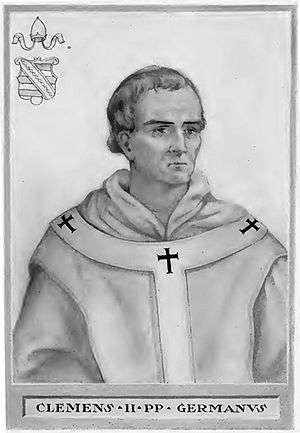1046
Year 1046 (MXLVI) was a common year starting on Wednesday (link will display the full calendar) of the Julian calendar.
| Millennium: | 2nd millennium |
|---|---|
| Centuries: | |
| Decades: | |
| Years: |
| 1046 by topic |
|---|
| Leaders |
|
| Birth and death categories |
| Births – Deaths |
| Establishments and disestablishments categories |
| Establishments – Disestablishments |
| Gregorian calendar | 1046 MXLVI |
| Ab urbe condita | 1799 |
| Armenian calendar | 495 ԹՎ ՆՂԵ |
| Assyrian calendar | 5796 |
| Balinese saka calendar | 967–968 |
| Bengali calendar | 453 |
| Berber calendar | 1996 |
| English Regnal year | N/A |
| Buddhist calendar | 1590 |
| Burmese calendar | 408 |
| Byzantine calendar | 6554–6555 |
| Chinese calendar | 乙酉年 (Wood Rooster) 3742 or 3682 — to — 丙戌年 (Fire Dog) 3743 or 3683 |
| Coptic calendar | 762–763 |
| Discordian calendar | 2212 |
| Ethiopian calendar | 1038–1039 |
| Hebrew calendar | 4806–4807 |
| Hindu calendars | |
| - Vikram Samvat | 1102–1103 |
| - Shaka Samvat | 967–968 |
| - Kali Yuga | 4146–4147 |
| Holocene calendar | 11046 |
| Igbo calendar | 46–47 |
| Iranian calendar | 424–425 |
| Islamic calendar | 437–438 |
| Japanese calendar | Kantoku 3 / Eishō 1 (永承元年) |
| Javanese calendar | 949–950 |
| Julian calendar | 1046 MXLVI |
| Korean calendar | 3379 |
| Minguo calendar | 866 before ROC 民前866年 |
| Nanakshahi calendar | −422 |
| Seleucid era | 1357/1358 AG |
| Thai solar calendar | 1588–1589 |
| Tibetan calendar | 阴木鸡年 (female Wood-Rooster) 1172 or 791 or 19 — to — 阳火狗年 (male Fire-Dog) 1173 or 792 or 20 |
| Wikimedia Commons has media related to 1046. |

Pope Clement II (r. 1046–1047)
Events
By place
Europe
- Autumn – King Henry III (the Black) travels to Italy to secure the imposition of Guido da Velate, archbishop of Milan, and other similarly loyal candidates in other sees (like Ravenna, Verona and Modena).
- Vatha Pagan Revolt: King Peter Orseolo (the Venetian) is overthrown after a 2-year reign. Bishops Gerard of Csanád and Bystrík (or Bestricus) are stoned to death in Budapest (Hungary).
Britain
- Ealdred, bishop of Worcester, leads troops from England on an unsuccessful punitive raid against the Welsh leaders Gruffydd ap Rhydderch, Rhys ap Rhydderch and Gruffydd ap Llywelyn.[1][2]
Asia
- Bao Zheng (Lord Bao), a Chinese government officer during the reign of Emperor Ren Zong of the Song Dynasty, writes a memorial to the throne. He warns about governmental corruption – and a foreseeable bankruptcy of the Chinese iron industry – if increasingly poorer families continued to be listed on the register for iron-smelting households (while rich households avoid being listed for fear of financial calamity). Apparently the government heeds the warning, and produces more iron products by the year 1078 than China ever had before.
- Munjong is crowned the 11th king of Goryeo (Korea).
By topic
Exploration
- March 5 – Nasir Khusraw begins his 7-year Middle Eastern (19,000-kilometre) journey, which he later describes in the book Safarnāmé.
Religion
- Summer – Ex-Pope Benedict IX gives up a renewed attempt to reclaim the papal throne in Rome, Sylvester III reasserts his claim.
- December 20 – Pope Gregory VI is accused of simony at the Council of Sutri, and abdicates as pope of the Catholic Church.
- December 25 – Pope Clement II succeeds Gregory VI as the 149th pope, and crowns Henry III as Holy Roman Emperor.
- Hildesheim Cathedral (Germany) is largely destroyed by fire.
Births
- May 8 – Constance, queen of Castile and León (d. 1093)
- Afridun I (the Martyr), ruler (shah) of Shirvan (d. 1120)
- Bernard of Thiron, founder of the Order of Tiron (d. 1117)
- Ingegerd, queen of Denmark and Sweden (approximate date)
- Leo Marsicanus (or Ostiensis), Italian cardinal (d. 1115)
- Masud Sa'd Salman, Persian poet and writer (d. 1121)
- Matilda, margravine of Tuscany (d. 1115)[3]
Deaths
- January 24 – Eckard II (or Ekkehard), German nobleman (b. 985)
- February 26 – Fujiwara no Sanesuke, Japanese nobleman (b. 957)
- June 24 – Jeongjong II, king of Goryeo (b. 1018)
- July 18 – Elijah, bishop of Beth Nuhadra (b. 975)
- Art Uallach Ua Ruairc, king of Connacht
- Bystrík (or Bestricus), Hungarian bishop
- Eido II (or Egidius), bishop of Meissen (or 1045)
- Geoffrey II, count of Gâtinais (approximate date)
- Gerard of Csanád, Hungarian missionary-bishop
- Gothelo II, duke of Lower Lorraine (b. 1008)
- Lyfing of Winchester, English abbot and bishop
- Oliba, Spanish count, abbot and bishop
- Richard of Verdun, French abbot (b. 970)
- William I (Iron Arm), Norman nobleman
gollark: https://arxiv.org/pdf/2105.09938.pdf
gollark: A fun bit is that tasks and the privilege level are entirely orthogonal, and the security level of a thing is basically just what environment and upvalues it has.
gollark: All the background tasks are just Lua coroutines. You simply submit a function to run and a bit of metadata, and it runs them in the event loop.
gollark: PotatOS has a much better architecture for this.
gollark: I don't do portability; anyone trying to make my code work will have much bigger issues than the *platform*.
References
- Huscroft, Richard (2005). Ruling England 1042–1217. London: Pearson Longman. p. 49. ISBN 0-582-84882-2.
- Maund, Kari L. (2006). The Welsh Kings: Warriors, Warlords and Princes. Stroud: Tempus. pp. 89–90. ISBN 0-7524-2973-6.
- "Matilda of Canossa | countess of Tuscany". Encyclopedia Britannica. Retrieved March 18, 2019.
This article is issued from Wikipedia. The text is licensed under Creative Commons - Attribution - Sharealike. Additional terms may apply for the media files.